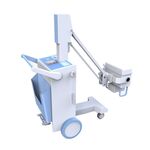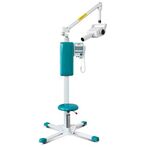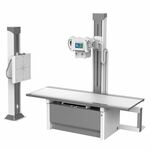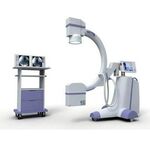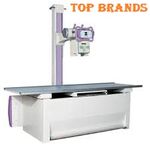Xray Machine
An X-ray machine is a device that uses X-ray technology to create images of the internal structures of the body. It helps diagnose and monitor various medical conditions by capturing detailed visuals of bones, organs, and tissues.
What is a X-Ray Machine?
An X-ray machine passes X-rays through the body, with denser structures like bones absorbing more radiation, creating distinct images that appear on a detector or film. X-ray machines come in various forms, such as conventional X-ray machines for standard imaging, portab le X-ray machines for bedside use, and digital X-ray machines for instant image processing. This machine is used to diagnose fractures, infections, tumors, and conditions like pneumonia, as well as to guide medical procedures like surgeries or biopsies. Modern X-ray machines are designed to limit radiation exposure, and protective gear like lead aprons is used to enhance safety during imaging.
What is the function of X-Ray Machine?
The primary function of an X-ray machine is to create images of the internal structures of the body to assist in diagnosing and monitoring medical conditions. It uses X-ray radiation to capture detailed visuals of bones, organs, and soft tissues.
Key Functions of X-Ray Machines:
X-ray machines help detect fractures, dislocations, and bone diseases like osteoporosis by providing clear images of skeletal structures. X-ray machines are used to identify medical conditions such as lung infections, tumors, and other abnormalities in organs. These machines assist in real-time during procedures like inserting catheters, stents, or needles, especially using fluoroscopic X-ray machines. It help track the progress of treatments, such as checking bone healing after fractures or evaluating lung function during recovery.
How does the work X-Ray Machine?
An X-ray machine works by using X-rays, a type of electromagnetic radiation, to create images of the internal structures of the body. It passes X-rays through the body, which are absorbed at different levels by various tissues, producing a detailed image.
How an X-Ray Machine Works:
The X-ray machine produces X-rays using a special tube where electrons are accelerated and collide with a metal target, releasing X-ray energy. When the X-ray machine directs X-rays toward the body, the rays pass through tissues at different rates. Dense materials like bones absorb more X-rays, while softer tissues absorb less. On the other side of the body, the X-ray machine detects the rays using film or a digital detector. The amount of X-rays absorbed determines the contrast in the image, with bones appearing white and softer tissues showing as gray or black. In digital X-ray machines, the captured data is converted into a digital image, allowing for easy viewing, storage, and sharing.
What are the features of X-Ray Machine?
An X-ray machine is an essential medical device with several features designed to provide accurate and efficient imaging for diagnosing health conditions. Its features focus on image clarity, safety, and ease of use.
Digital Imaging Capabilities: Many modern X-ray machines are equipped with digital detectors, allowing instant image capture, storage, and sharing without the need for traditional film processing.
Adjustable Radiation Levels: X-ray machines include settings to adjust radiation doses, ensuring patient safety by using the minimum exposure required for quality images.
Portability in Certain Models: Portable X-ray machines are lightweight and can be moved to patient bedsides or remote locations, making them ideal for emergencies and on-site imaging.
User-Friendly Interface: X-ray machines often include easy-to-navigate controls and displays, simplifying operation for healthcare professionals and reducing the risk of errors.
Durable and Reliable Design: X-ray machines are built to withstand frequent use in busy medical environments, ensuring consistent performance over time.
Overview of X-Ray Machine Price:
At Biomed Supplier, you can buy the latest x-ray machine from the most reputable brands at an economical price compared to other sellers. If you want to buy an advanced mobile x-ray unit, you'll buy it INR 1.3 lakh to INR 5 lakh pricing range.
Here is the list of X ray machine in India:
Different types of X-Ray Machine:
X-ray machines come in various types, each designed for specific diagnostic and treatment purposes. The type of X-ray machine used depends on the medical need, the part of the body being examined, and the setting.
Types of X-Ray Machines:
Portable X-Ray Machine: These machines are used in emergency situations, bedside imaging, and home healthcare. They are lightweight and compact, allowing easy transport to different locations. Portable X-ray machines are commonly used in ICUs, ambulances, and rural areas where fixed machines are unavailable.
Mobile X-Ray Machine: Larger than portable machines but still movable, these units are used in hospitals for imaging patients who cannot be transported to the radiology department. They are mounted on wheels and can be maneuvered easily. Mobile X-ray machines are ideal for ICU, trauma, and surgical cases.
Fluoroscopy X-Ray Machine: This machine provides real-time moving images of internal structures using continuous X-ray beams. It is used for guiding procedures like catheter placement, barium studies, and angiography. Fluoroscopy helps doctors observe organs in motion, making it valuable for gastrointestinal, cardiovascular, and orthopedic examinations.
Computed Radiography (CR) X-Ray Machine: CR X-ray machines use digital imaging plates instead of traditional film to capture X-ray images. The plates are scanned to produce high-resolution digital images. CR systems offer better storage, faster processing, and lower radiation exposure compared to conventional film-based X-ray machines.
Digital Radiography (DR) X-Ray Machine: DR X-ray machines directly capture digital images without the need for scanning. They provide instant results, high image quality, and lower radiation exposure. These systems are widely used in modern hospitals and diagnostic centers for faster and more efficient radiographic examinations.
C-Arm X-Ray Machine: A specialized X-ray machine with a C-shaped arm, used in surgeries, orthopedics, and pain management procedures. It provides real-time fluoroscopic imaging, assisting doctors during minimally invasive procedures like fracture fixation, catheter placements, and spinal surgeries. C-arm machines offer flexible positioning and high image clarity.
Dental X-Ray Machine: Used by dentists for imaging teeth, gums, and jaw structures, these machines help diagnose cavities, root infections, and bone loss. They come in intraoral and extraoral types, including panoramic X-ray machines that provide a full view of the mouth in a single image.
Mammography X-Ray Machine: Specially designed for breast imaging, mammography machines detect breast cancer at an early stage. They use low-dose X-rays to capture detailed images of breast tissue. Advanced 3D mammography (tomosynthesis) improves accuracy by providing multiple image layers for better detection of abnormalities.
Best Brands of X-Ray Machine:
Here are some of the best brands of X-ray machines known for their quality, innovation, and reliability:
Allengers x ray machine: A leading Indian brand, Allengers offers high-quality digital and analog X-ray machines for hospitals and clinics. Their machines feature advanced imaging, low radiation exposure, and user-friendly designs. Allengers provides solutions for general radiography, fluoroscopy, and specialized imaging, making them a reliable choice for medical diagnostics.
Siemens x ray machine: Siemens is a globally recognized brand known for its cutting-edge X-ray machines with high-resolution imaging and AI-driven enhancements. Their machines include digital radiography, fluoroscopy, and mobile X-ray systems. Siemens X-ray machines are widely used in hospitals for their efficiency, reliability, and advanced diagnostic capabilities.
Adonis x ray machine: Adonis offers a range of cost-effective X-ray machines with innovative technology for superior image quality. Their digital and portable X-ray systems are designed for ease of use and precision in diagnostics. Adonis machines are ideal for small clinics, hospitals, and emergency medical applications.
Fuji x ray machine: Adonis offers a range of cost-effective X-ray machines with innovative technology for superior image quality. Their digital and portable X-ray systems are designed for ease of use and precision in diagnostics. Adonis machines are ideal for small clinics, hospitals, and emergency medical applications.
Ams x ray machine: AMS manufactures high-quality, affordable X-ray machines with digital and analog options for various medical applications. Their machines are designed for reliability and efficiency, making them suitable for hospitals, clinics, and diagnostic centers. AMS X-ray systems provide clear imaging and easy operation for accurate medical diagnoses.
Agfa x ray machine: Agfa is a global leader in digital imaging technology, offering X-ray machines with high-speed processing and excellent image resolution. Their systems support digital radiography, fluoroscopy, and computed radiography. Agfa X-ray machines are widely used in hospitals for efficient workflow, low-dose imaging, and superior diagnostic accuracy.
Things to be considered before buying a X-Ray Machine:
Before buying an X-ray machine, consider these key factors to ensure you get the right one for your needs:
Type of X-Ray Machine – Choose between fixed, portable, digital, or analog X-ray machines based on your facility's requirements and patient volume.
Image Quality & Resolution – Ensure the machine provides high-resolution images for accurate diagnosis, especially for detecting fine details in bones and soft tissues.
Digital vs. Analog – Digital machines offer faster image processing, lower radiation exposure, and easy storage, while analog machines require film and processing chemicals.
Portability & Mobility – If you need flexibility, consider portable or mobile X-ray machines for bedside imaging, emergency use, or field applications.
Ease of Use & Software Features – User-friendly controls, touchscreen interfaces, and AI-enhanced imaging can improve efficiency and ease of diagnosis.
Cost & Budget – Consider the initial cost, maintenance expenses, and film or digital storage costs to ensure affordability and long-term value.
Brand & Manufacturer Support – Opt for a reputable brand with good after-sales service, warranty, and availability of spare parts.
Regulatory Approvals & Certifications – Ensure the X-ray machine complies with medical safety standards (like FDA, CE, AERB) to meet legal and quality requirements.
Why should you buy the X-Ray Machine from Biomed Supplier?
You should buy an X-ray machine from Biomed Supplier because they offer high-quality products, competitive pricing, and reliable after-sales support. They ensure you get the latest technology with warranty protection, expert guidance, and hassle-free installation. Here are key reasons to choose Biomed Supplier:
1. Wide Range of X-Ray Machines
2. High-Quality and Certified Products
3. Competitive Pricing & Cost-Effective Solutions
4. Warranty & After-Sales Support
FAQ's:
1. What is an X-ray machine used for?
An X-ray machine is used for medical imaging to diagnose bone fractures, lung infections, dental issues, and internal organ conditions. It helps doctors detect abnormalities inside the body.
2. What are the different types of X-ray machines?
Common types include fixed X-ray machines, portable X-ray machines, digital radiography (DR) systems, computed radiography (CR) systems, C-arm machines, fluoroscopy machines, dental X-ray machines, and mammography machines.
3. What is the difference between digital and analog X-ray machines?
Digital X-ray machines provide instant images, better quality, and lower radiation exposure, while analog X-ray machines require film processing, which is slower and less efficient.
4. What safety precautions should be taken when using an X-ray machine?
Operators should use lead aprons, thyroid shields, and radiation monitoring devices. Patients should also be protected with appropriate shielding to minimize exposure.
5. How often does an X-ray machine need maintenance?
Regular preventive maintenance is required every 6-12 months to ensure proper functioning. Digital machines may require software updates and sensor calibration.
6. Can a portable X-ray machine provide the same quality as a fixed one?
Modern digital portable X-ray machines offer excellent image quality, though fixed X-ray machines still provide higher resolution for detailed imaging.
7. Where can you buy a high-quality X-ray machine?
You can purchase X-ray machines from Biomed Supplier, hospital equipment stores, and authorized dealers of brands like Siemens, Allengers, Fuji, and Agfa.

